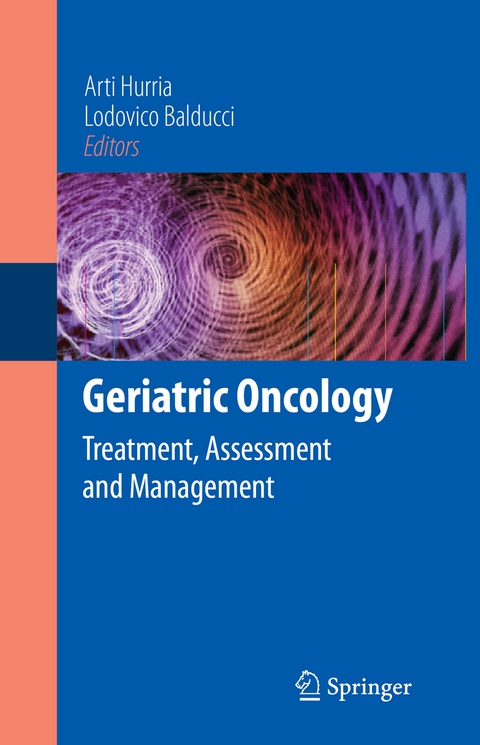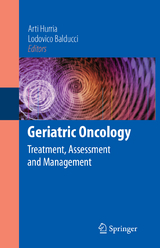Geriatric Oncology
Treatment, Assessment and Management
Seiten
2009
|
2009 ed.
Springer-Verlag New York Inc.
978-0-387-89069-2 (ISBN)
Springer-Verlag New York Inc.
978-0-387-89069-2 (ISBN)
Cancer and aging are integrally related. Cancer incidence and mortality increase with age, with most cancer diagnoses and deaths occurring in patients aged 65 and older. This demographic shift, combined with the known association of cancer and aging, is expected to bring about a rapid growth in the older cancer-patient population.
Cancer and aging are integrally related. Cancer incidence and mortality increase with age, with most cancer diagnoses and deaths occurring in patients aged 65 and older. The aging of the Baby Boomer population, along with an overall increase in life expectancy, points to a doubling of the U.S. population over age 65 by the year 2030. This demographic shift, combined with the known association of cancer and aging, is expected to bring about a rapid growth in the older cancer-patient population. It is clear that geriatric principles must become part of oncology care. The evaluation and development of treatment recommen- tions for an older adult with cancer can be challenging for many reasons. Tumor biology and response to therapy are affected by age. In addition, age-related factors may impact treatment patterns, tolerance, and efficacy. These age-related factors include functional status declines, comorbid conditions, changes in cognitive function, weakening of organ function, decreases in physiologic reserve, and faltering social support.
Cancer and aging are integrally related. Cancer incidence and mortality increase with age, with most cancer diagnoses and deaths occurring in patients aged 65 and older. The aging of the Baby Boomer population, along with an overall increase in life expectancy, points to a doubling of the U.S. population over age 65 by the year 2030. This demographic shift, combined with the known association of cancer and aging, is expected to bring about a rapid growth in the older cancer-patient population. It is clear that geriatric principles must become part of oncology care. The evaluation and development of treatment recommen- tions for an older adult with cancer can be challenging for many reasons. Tumor biology and response to therapy are affected by age. In addition, age-related factors may impact treatment patterns, tolerance, and efficacy. These age-related factors include functional status declines, comorbid conditions, changes in cognitive function, weakening of organ function, decreases in physiologic reserve, and faltering social support.
Aging and Cancer: What Oncologists Need to Know.- Assessing the Older Cancer Patient.- Cancer Screening in Older Adults.- Physiological Consequences of Aging.- Assessment and Impact of Comorbidity in Older Adults with Cancer.- Geriatric Syndromes Defined and Explained for Oncology Practice.- Family Caregivers.- Surgical Management of the Older Patient with Cancer.- Chemotherapy for the Older Adult with Cancer.- Radiation Therapy in Geriatric Oncology.- Palliative Care: Special Considerations for Older Adults with Cancer.
| Erscheint lt. Verlag | 7.8.2009 |
|---|---|
| Zusatzinfo | 7 Illustrations, color; 10 Illustrations, black and white; X, 346 p. 17 illus., 7 illus. in color. |
| Verlagsort | New York, NY |
| Sprache | englisch |
| Maße | 127 x 203 mm |
| Themenwelt | Medizin / Pharmazie ► Medizinische Fachgebiete ► Geriatrie |
| Medizin / Pharmazie ► Medizinische Fachgebiete ► Onkologie | |
| ISBN-10 | 0-387-89069-6 / 0387890696 |
| ISBN-13 | 978-0-387-89069-2 / 9780387890692 |
| Zustand | Neuware |
| Haben Sie eine Frage zum Produkt? |
Mehr entdecken
aus dem Bereich
aus dem Bereich
Das Wichtigste für Ärztinnen und Ärzte aller Fachrichtungen
Buch | Softcover (2021)
Urban & Fischer in Elsevier (Verlag)
CHF 51,80
Zukunftssicherheit der Geriatrie - Konzept und Bedarfszahlen
Buch | Softcover (2023)
Kohlhammer (Verlag)
CHF 49,95




